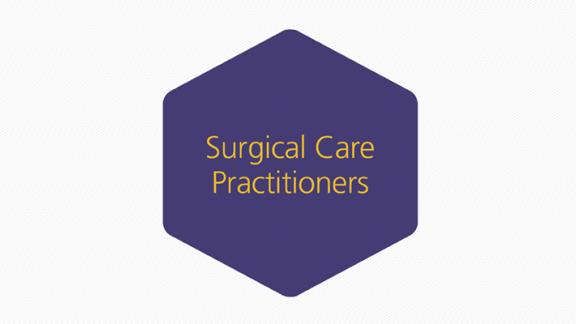Surgical care practitioners

More information on the surgical care practitioner role, including what training and qualifications they have and how they work within the NHS.
What are surgical care practitioners (SCPs)?
Surgical care practitioners (SCPs) are registered non-medical healthcare professionals (nurses, operating department practitioners or other allied health professionals) who have extended the scope of their practice by completing an accredited training programme. They work as members of surgical team and can perform surgical interventions and pre- and post-operation care to patients, to a pre-determined level of autonomy and supervision (case-by-case), under the direction and supervision of the operating surgeon.
What can surgical care practitioners do?
The role encompasses pre-, peri- and post-operative care. Under the direction of a senior surgeon, the SCP can:
- perform preoperative assessments, including clinical examination and enhanced recovery education as directed by the surgical team
- enhance the communication links between theatre, patient and ward
- assist with the preparation of the patient, including male and female catheterization and venepuncture, patient positioning and preparation
- provide assistance with surgical procedures as directed by the supervising surgeon
- offer some technical and operative procedures according to their scope of practice
- arrange appropriate pre and postoperative investigations as part of the surgical MDT
- carry out post-operative care – including wound assessment and identification of surgical problems and complications
- evaluate care, including the discharge process, follows up care and outpatient activities
- research, development, education and audit within the surgical department.
What training and qualifications do surgical care practitioners have?
SCPs are registered non-medical practitioners who have completed a two year Royal College of Surgeons (RCS) accredited programme consisting of both a taught and a practical element. In the second year of the programme there is a specialisation in a chosen surgical sub-specialty.
There are a number of educational routes through which this can be achieved including completion of a minimum graduate programme of study offered by a number of academic institutes. In addition, stand-alone study days, such as a surgical skill workshop, can also help the SCP attain appropriate skills.
How do surgical care practitioners fit into the NHS workforce?
Once qualified, SCPs can enhance patient care, maintain surgical services and support surgical training, such as by releasing consultant time to train. They can also improve the continuity of patient care and communications for patients and the multidisciplinary team of patient care and communications for patients and the multidisciplinary team.
NHS England hosts a series of high impact case studies looking at the role surgical care practitioners may play as part of the MDT.
Further information
There are a range of resources available for further information on surgical care practitioners including:



